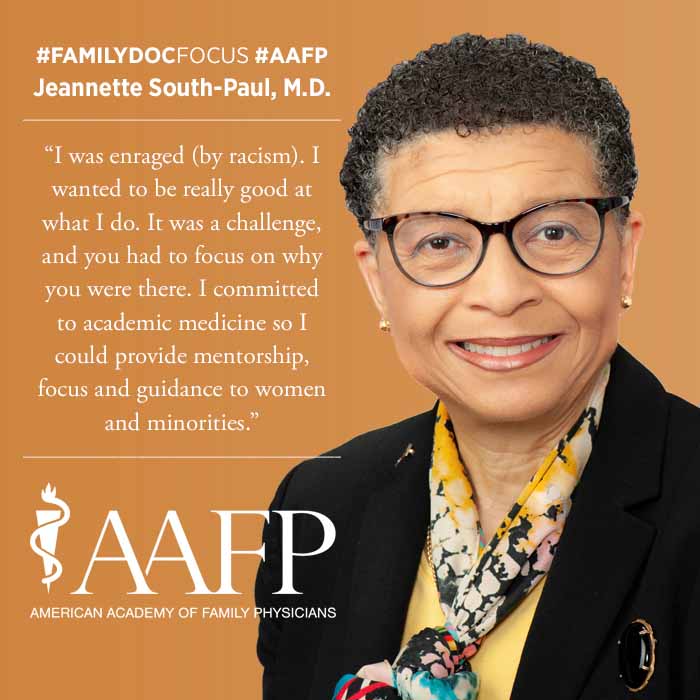Mentor Blazed a Trail Worth Following
February 03, 2020 01:02 pm David Mitchell – It didn't take long for Jeannette South-Paul, M.D., to experience the inequities of the U.S. health care system. Her mother, a Jamaican immigrant, was barred from delivering her child at an Alabama hospital in 1953.
"There wasn't a hospital south of Birmingham that would deliver minority women," said South-Paul, who was born a year before the Supreme Court's landmark ruling in Brown v. Board of Education led to the eventual desegregation of public schools across the country and two years before Rosa Parks' arrest on a city bus in Montgomery shined a national spotlight on segregation in the state.
South-Paul's mother faced the unenviable choice of driving more than 100 miles to that hospital in Birmingham, traveling roughly 25 miles to Greensboro -- where a white general practitioner delivered babies in his office -- or having her baby at home.
She chose Greensboro.
"Dr. Norman delivered her on an exam table," South-Paul said. "My mother rested on a couch for a while and then went home. That's how black women were delivered at the time."

South-Paul's family later moved to Philadelphia, where her parents ran a rescue mission. The experience set her on the path to a career in medicine.
"I saw folks who had no access to care," she said. "It was a diverse group of people --African Americans and white Americans. They were largely men. By the time I finished high school, it was transitioning to families. I thought, 'Someone needs to focus on helping people who are economically underserved.'"
South-Paul turned out to be one of those people. She attended the Philadelphia High School for Girls, a magnet school with a competitive enrollment process. Her "wonderful experience" there instilled the belief that she could become anything she wanted.
Her goal was to become a family physician, so she moved on to the University of Pennsylvania and later the University of Pittsburgh School of Medicine. South-Paul said she encountered overt racism in both places. As affirmative action programs gained traction in the 1970s, there was a backlash against black students.
"There was an attitude that, 'You don't have to worry because you're black,'" she said. "I was stunned and put off. People thought I didn't deserve something or that things were handed to me. I worked really hard all the time."
At Pitt, South-Paul was one of four black students in a medical school class of 140. There were only two minority faculty members, she said, and many white professors were reluctant to mentor her. She also was denied housing in the school's Oakland neighborhood.
"I was enraged," she said. "I wanted to be really good at what I do. It was a challenge, and you had to focus on why you were there. I committed to academic medicine so I could provide mentorship, focus and guidance to women and minorities."
South-Paul left Pittsburgh after graduating, vowing never to return.
Having joined the Army ROTC to pay for her education, she embarked on a long career in the military, starting at the Dwight David Eisenhower Army Medical Center Family Practice Residency at Fort Gordon, Ga.
She later served nearly two decades as faculty at the Uniformed Services University of the Health Sciences in Bethesda, Md., including roles as vice president for minority affairs and chair of the Department of Family Medicine, before retiring from the military in 2001.
"The Army was one of the best things that ever happened to me," she said. "I felt like everyone else. I felt embraced and I moved up the ladder."
South-Paul climbed that ladder to the rank of colonel. She also has taken on a variety of family medicine leadership roles, including president of the Society of Teachers of Family Medicine and the Uniformed Services AFP, as well as board member of the Association of Departments of Family Medicine. She has been a delegate and an alternate delegate to the AAFP Congress of Delegates, in addition to working on various Academy commissions, committees and more.
South-Paul didn't stay retired long. The University of Pittsburgh School of Medicine asked her -- repeatedly -- to come home.
She said no.
But there were letters, phone calls and outreach at national meetings. Eventually, she listened. South-Paul remembered all the challenges she had faced so many years before, but she also thought about the future.
"I realized I had an opportunity to make a difference, and that I wouldn't be in the same vulnerable position that I was in as a student there," she said.
When South-Paul returned to Pitt as family medicine chair in 2001, she was the school's first woman and first member of a racial/ethnic minority to serve as a permanent chair.
"I've worked hard," said South-Paul, who retired from that role at the end of January. "There's still more work to do."
South-Paul and her husband have retired to suburban Washington, D.C., but she said she's not finished working. She plans to consult, speak and continue to serve on various boards and committees.
South-Paul practiced full-scope family medicine, including maternity care, until a few years ago. She said she's not ready to give up patient care completely and hopes to find a free clinic where she can practice.
As a medical student, South-Paul once traveled through Alabama to a medical rotation. On a whim she stopped in Greensboro, looked in the phone book for that then-elderly general practitioner who had delivered her, called him and asked for a meeting. She spent 90 minutes in his home talking about family medicine and the joys of delivering babies.
"That's a treasure as a family physician to care for families, to take women through pregnancy, deliver them and care for the children," she said. "There's nothing like it."